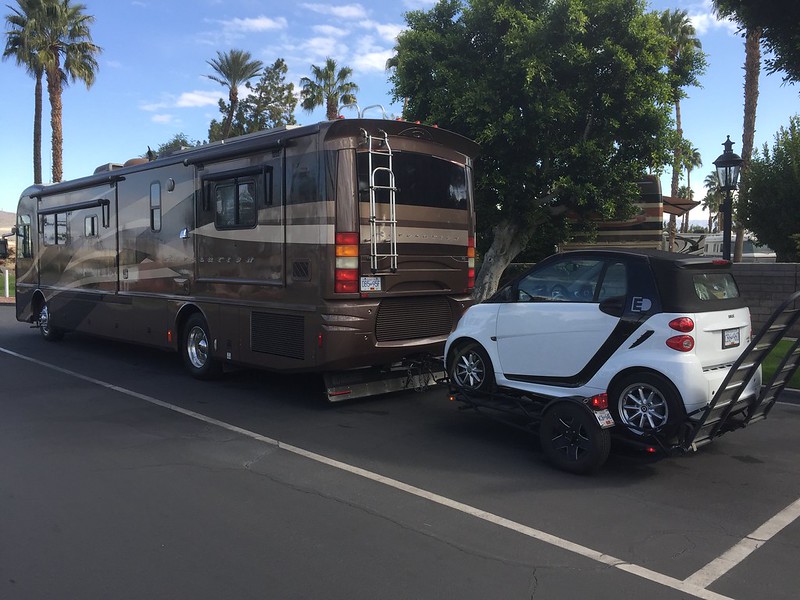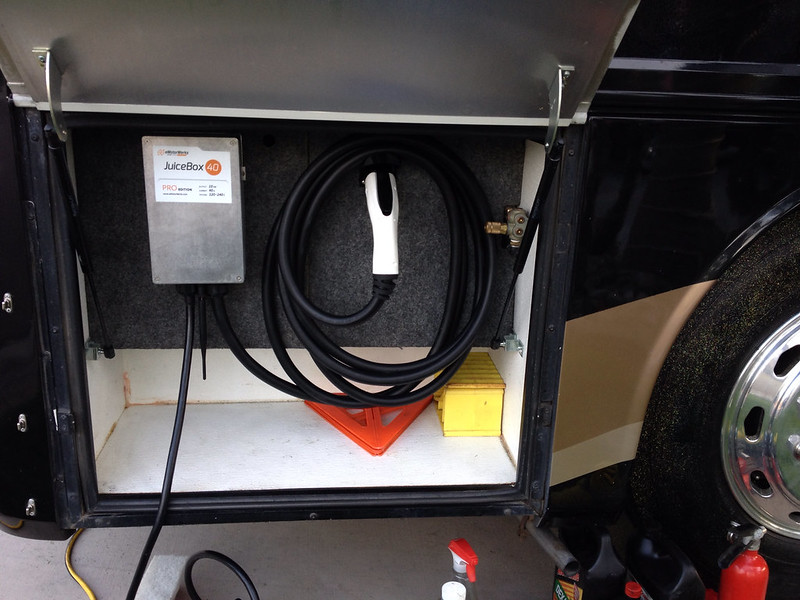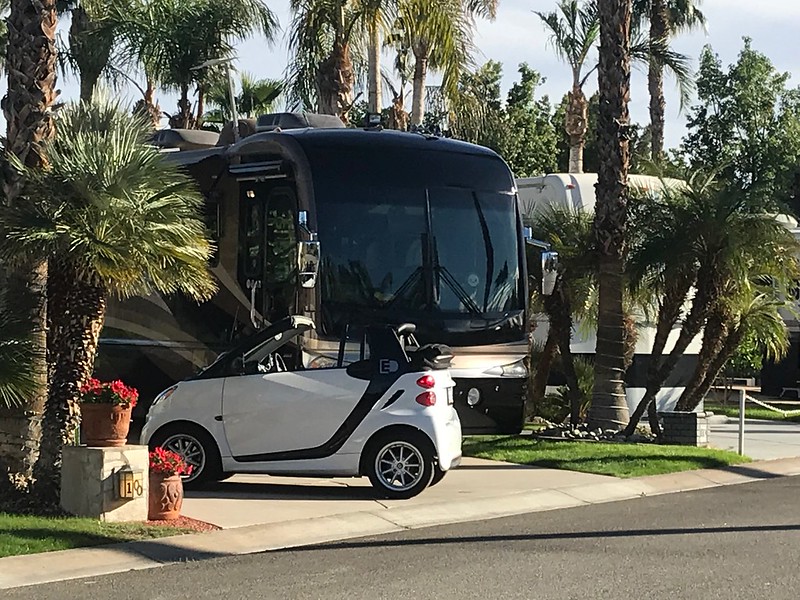Welcome to Tesla Motors Club
Discuss Tesla's Model S, Model 3, Model X, Model Y, Cybertruck, Roadster and More.
Register
Install the app
How to install the app on iOS
You can install our site as a web app on your iOS device by utilizing the Add to Home Screen feature in Safari. Please see this thread for more details on this.
Note: This feature may not be available in some browsers.
-
Want to remove ads? Register an account and login to see fewer ads, and become a Supporting Member to remove almost all ads.
You are using an out of date browser. It may not display this or other websites correctly.
You should upgrade or use an alternative browser.
You should upgrade or use an alternative browser.
Flat towing MX behind RV
- Thread starter Pwdr Extreme
- Start date
Sandiegodoug
Active Member
We flat tow an automatic Jeep rubiconCars that can be flat towed have some method to lubricate the differential. In a stick shift, it's splash lube of gear oil from the turning shaft. In an automatic that is approved for flat towing, the transaxle has a rear pump that is driven off of the output shaft, so towing it runs the pump.
Honestly flat towing adds normal wear and tear even when the differential is lubricated; a tow dolly is much cheaper in the long run.
Some of the Saturns are great choices for flat towing because they are cheap, light, and have the rear pump.
Flat towing a tesla even if it had lubrication would wear the drive unit. It's not a wise choice.
Nate
It has a transfer case, and when you put
transfer case in neutral, the Jeep just free wheels.
muleferg
Active Member
Or you could just use a car hauler trailer towed behind your motor home. That's what I do with my Model S.
It takes a few minutes longer to load/unload, but I've found the benefits include better mpg towing (my average mpg when from ~7 to 8mpg on my diesel pusher), the ability to back up, better protection and less wear and tear on my Model S.
When you say 1mpg better with a trailer, what’s that in comparison to?
I have a 4 door 1/2 ton Ram I flat tow. And I’ve pulled my Mercedes E550 on my 22’ aluminum flatbed. Can’t say I’ve noticed much if any difference in fuel mileage. This is with a 43’ tandem axle diesel.
With my flatbed I’m right at 70’ long. The same or slightly longer than a typical 18 wheeler. No problem going down the road, but limits the campsite possibilities.
I do agree not being able to back up a flat tow vehicle is a major pita. But I’m hitched and rolling in about 3 minutes (literally). No way you can load the trailer and tie the car down that fast.
When you say 1mpg better with a trailer, what’s that in comparison to?
I have a 4 door 1/2 ton Ram I flat tow. And I’ve pulled my Mercedes E550 on my 22’ aluminum flatbed. Can’t say I’ve noticed much if any difference in fuel mileage. This is with a 43’ tandem axle diesel.
With my flatbed I’m right at 70’ long. The same or slightly longer than a typical 18 wheeler. No problem going down the road, but limits the campsite possibilities.
I do agree not being able to back up a flat tow vehicle is a major pita. But I’m hitched and rolling in about 3 minutes (literally). No way you can load the trailer and tie the car down that fast.
I've noticed an almost +1mpg gain in comparison to flat towing a Honda Pilot on a 20' flat bed with my 40' single rear axle Cummins 350 Diesel coach. YMMV. And yes, as I said, it takes a few minutes longer, but I feel it's worth it for the benefits cited. Again, YMMV.
I agree that the total length limits the campsite possibilities. IMO, that's the biggest disadvantage.
Are either of you guy's full timing? I will be in 2.5 years. At that point I think there will be some variant of a electric class A
Winnebago is already making one but not for the rv world.
I am sure for me it will be a Diesel pusher flat towing a Jeep. But would love to have a all electric rig at some point.
Winnebago is already making one but not for the rv world.
I am sure for me it will be a Diesel pusher flat towing a Jeep. But would love to have a all electric rig at some point.
Are either of you guy's full timing? I will be in 2.5 years. At that point I think there will be some variant of a electric class A
Winnebago is already making one but not for the rv world.
I am sure for me it will be a Diesel pusher flat towing a Jeep. But would love to have a all electric rig at some point.
No, but if you're really interested in a all-electric solution there are some folks that posted awhile back about towing an Airstream trailer behind a Model X. I recall that it cut their mileage roughly in half, but with the expanding supercharger network, it's definitely doable.
Webeevdrivers
Active Member
This is our setup. Just a note. We know a few people that tow their gas powered smart cars 4 down. All of them have lots of road wear as the coach kicks stuff up and the car wears it. Our Electric smart has just as many miles but is in excellent shape. Its not that much higher but seems to fair better. Takes about 6 or 7 minutes to strap it down. The biggest advantage...I can back up...its a trailer. You can't back up a car being towed 4 down.

The EVSE mounted in front cabinet.



The EVSE mounted in front cabinet.


Webeevdrivers
Active Member
Nice setup ....is it possible to charge to smart car from alternator while your diving the rv?
Not that I know of, or that I have heard of. We are actually planning for it’s replacement down the road, maybe a couple years. We were originally thinking something like the model 3 or even the Y but the trade war with the US has ended that. The next version of the model BMW i3 could be a contender but info is spotty at best on what it’s future is. We really like the car and a working 300 kilometre range would be more than adequate (if the do that). The dimensions are not huge but would still require going to a dual axle trailer. In the meantime we’ll stick with the smart. Lotsa fun, convertible, still kind of a head turner.
I've noticed an almost +1mpg gain in comparison to flat towing a Honda Pilot on a 20' flat bed with my 40' single rear axle Cummins 350 Diesel coach. YMMV. And yes, as I said, it takes a few minutes longer, but I feel it's worth it for the benefits cited. Again, YMMV.
I agree that the total length limits the campsite possibilities. IMO, that's the biggest disadvantage.
I’m running a 450hp Cummins, so bigger motor and bigger coach all around, probably not impacted as much by the weight or drag difference. Next trip out I’ll probably take the trailer again and really pay attention to the mileage.
There are DEFINITELY pros and cons to both methods, after having done both quite a bit, I would say the Trailer method is preferable, IF you have the room. (Typically I don’t in the places I go) Being a truck driver years ago, it absolutely kills me not being able to back up when flat towing.
Are either of you guy's full timing? I will be in 2.5 years. At that point I think there will be some variant of a electric class A
Winnebago is already making one but not for the rv world.
I am sure for me it will be a Diesel pusher flat towing a Jeep. But would love to have a all electric rig at some point.
I’m not, only 45 atm, hope to go mostly full time in about 10 yrs.
The “full time size” equivalent electric motorhome is probably a long way out yet. Basically it’s going to need the tech they are working on in the electric semis, since a big 40’ class coach is running mostly the same equipment. But I do think once electric semis are out and successful, a coach soon follow.
(Yes, I know you CAN full time in a 22’ class C, but most are doing it in 40’+ diesel pushers)
Peteybabes
redneck drivin' a tesla...
would you consider switching to the new MCI J4500e as an RV replacement?Not that I know of, or that I have heard of. We are actually planning for it’s replacement down the road, maybe a couple years. We were originally thinking something like the model 3 or even the Y but the trade war with the US has ended that. The next version of the model BMW i3 could be a contender but info is spotty at best on what it’s future is. We really like the car and a working 300 kilometre range would be more than adequate (if the do that). The dimensions are not huge but would still require going to a dual axle trailer. In the meantime we’ll stick with the smart. Lotsa fun, convertible, still kind of a head turner.
https://ngtnews.com/all-electric-j4500e-motor-coach-testing-goes-off-without-a-hitch
The thing with MCI and Prevost like coaches they are already Million dollar+ coaches.would you consider switching to the new MCI J4500e as an RV replacement?
https://ngtnews.com/all-electric-j4500e-motor-coach-testing-goes-off-without-a-hitch
But I like the direction!
Peteybabes
redneck drivin' a tesla...
you are correct.The thing with MCI and Prevost like coaches they are already Million dollar+ coaches.
But I like the direction!
the only previous competition was this: http://en.byd.com/usa/bus/c10-electric-motor-coach/
Yikes 49,000 lbs!you are correct.we don't know @Webeevdrivers circumstances either, lol.
the only previous competition was this: http://en.byd.com/usa/bus/c10-electric-motor-coach/
We ..well I need a 35 footer with 10k towing capacity and keep the weight under 35k
Webeevdrivers
Active Member
you are correct.we don't know @Webeevdrivers circumstances either, lol.
the only previous competition was this: http://en.byd.com/usa/bus/c10-electric-motor-coach/
Peteybabes
redneck drivin' a tesla...
dreams are free!!. Yah no. We barely crack six figures per year. That kinda coach is above our pay grade.
Sigh.....
Peteybabes
redneck drivin' a tesla...
http://en.byd.com/usa/bus/c9-electric-motor-coach/ is less, but range tanks to 155 miles.Yikes 49,000 lbs!
We ..well I need a 35 footer with 10k towing capacity and keep the weight under 35k
Similar threads
- Replies
- 7
- Views
- 583
- Replies
- 30
- Views
- 3K
- Replies
- 5
- Views
- 1K


